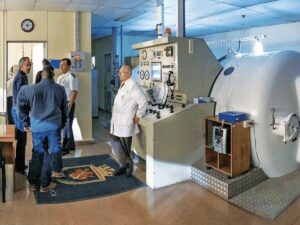Can anyone sleep inside a hyperbaric chamber? Absolutely, it is possible and often encouraged during treatments to enhance comfort and efficacy.
With years of expertise in hyperbaric solutions across sectors such as healthcare, sports, and marine safety, I provide insights rooted in up-to-date research and thorough industry knowledge.
In this review, we explore the feasibility of sleeping in hyperbaric chambers. We’ll cover safety protocols, operational benefits, and practical guidance tailored for businesses integrating or utilizing this technology.
Discover strategic advantages!
1. The Science Behind Hyperbaric Chambers
Hyperbaric chambers enhance atmospheric pressure in a controlled setting, enabling the body to absorb more oxygen than under normal conditions. This chamber help to saturates body tissues with oxygen, significantly aiding in recovery and healing.
They must be wondering, about the massive potential of the hyperbaric oxygen chamber market. Valued at $228 million in 2023, expected to reach $367.1 million by 2030, growing at a 6.9% CAGR from 2024-2030. This growth highlights the increased interest in these chambers and its role in enhancing medical treatments and wellness, according to Industry Today.
2. Potential Benefits of Sleeping in Hyperbaric Chambers
Building on the science behind hyperbaric chambers, it’s clear that the enhanced oxygen environment can have profound effects on the body. The potential benefits offer a unique approach to health and recovery. Here are some key advantages:
Improved Sleep Quality
Sleeping in a hyperbaric chamber can significantly elevate oxygen levels in the blood, potentially resulting in deeper and more rejuvenating sleep. And the best part is, this proves particularly advantageous for those wrestling with sleep challenges or aiming to enhance their sleep quality for improved health.
Enhanced Recovery
The use of a hyperbaric oxygen chamber during sleep can accelerate the healing process. For example, athletes who suffer from muscle strains may find that the increased oxygen delivery to tissues promotes faster repair and can reduce inflammation, helping their muscles and injuries to recover quicker.
Boosted Immune Function
By enhancing the body’s ability to fight infection and kill bacteria, sleeping in a hyperbaric chamber can lead to a stronger immune system. This preventive measure is particularly valuable during flu season or when exposed to environments where illnesses are more common.
Cognitive Enhancements
Regular sessions in a hyperbaric chamber can improve cognitive function by promoting increased blood flow to the brain. This can lead to better concentration, memory retention, and overall brain health, offering a non-invasive way to support mental acuity.

3. Ideal Candidates for Sleeping in Hyperbaric Chambers
Following our exploration of the potential benefits that sleeping in hyperbaric chambers offers, it’s clear that this practice can significantly enhance recovery and therapy outcomes. Now, let’s identify who stands to benefit the most from these treatments. Here are the primary groups:
Chronic Wound Patients
Individuals with chronic wounds enhanced oxygenation promotes collagen synthesis and angiogenesis, crucial for wound repair. For example, patients with diabetic foot ulcers who undergo regular hyperbaric treatments often show significant improvement within weeks.
Individuals with Neurological Conditions
Patients suffering from stroke or traumatic brain injuries may benefit from overnight stays in hyperbaric chambers. The increased oxygen supply can help reduce inflammation and aid in the recovery of brain function.
Athletes Seeking Faster Recovery
Athletes involved in high-intensity sports can use hyperbaric chamber to accelerate recovery processes. This method helps to reduce muscle fatigue and improve overall performance by enhancing tissue repair and growth.
Elderly Patients with Circulatory Issues
Elderly individuals suffering from circulatory problems can also benefit from sleeping in hyperbaric chambers. The enhanced oxygen levels can improve blood flow, aid in healing, and potentially alleviate symptoms related to conditions such as peripheral artery disease or venous insufficiency.

4. Safety Protocols for Sleeping in a Hyperbaric Chamber
After identifying ideal candidates for overnight hyperbaric sessions, ensuring safety becomes paramount. We implement strict protocols to protect all participants. Below, we outline the key measures that make these treatments both safe and effective:
Pre-Sleep Chamber Inspection
Before using Oxygen-ark hyperbaric chamber, it’s crucial to conduct a thorough pre-sleep inspection. This involves checking the chamber’s structural integrity, ensuring all seals and valves are secure, and verifying that the oxygen supply and emergency systems are fully operational. This helps to ensure a safe and effective approach for users.
Safety Gear and Procedures
Users should wear appropriate safety gear, such as cotton clothing, to prevent static and reduce fire risks. Establish and follow a checklist of procedures before entry, such as removing potentially hazardous materials and ensuring communication devices are functional.
Monitoring During Use
Continuous monitoring is essential while sleeping in a hyperbaric chamber. This section would cover the types of monitoring equipment used to track internal pressure, oxygen levels, and the occupant’s vital signs, ensuring that any deviations from normal conditions are quickly addressed.
Emergency Preparedness
Equip the chamber with an easily accessible emergency release mechanism. Train users on emergency procedures, including how to evacuate the chamber safely and quickly. Have emergency contact numbers and a first aid kit readily available.

5. Possible Side Effects When Sleeping in Hyperbaric Chamber
After delving into safety protocols, it’s time to tackle the potential side effects of using a hyperbaric chamber for sleep. Despite their unique health benefits, these chambers have a list of possible side effects to consider. Here are some common ones:
Ear and Sinus Discomfort
As the pressure changes within the chamber treatment, patient might experience discomfort or pain in ears and sinuses, similar to the feeling during an airplane takeoff or landing. Chewing gum or practicing pressure-equalizing techniques before the session can help alleviate this sensation.
Claustrophobia
The confined space of these chambers can trigger feelings of claustrophobia for some individuals. It’s important to communicate any feelings of discomfort to the supervising medical team, who can provide support and strategies to relax and adapt to the environment.
Fatigue
Experiencing fatigue after emerging from the chamber is not uncommon, particularly after an overnight session. This is generally a sign that the body is responding to these chambers and expending energy to heal. Ensuring having a period of rest, following the session can help manage this side effect.
Oxygen Toxicity
While rare, prolonged exposure to high concentrations of oxygen can lead to oxygen toxicity, affecting the lungs and central nervous system. Hyperbaric chamber sessions are carefully timed and monitored to prevent this, but it’s vital to report any unusual symptoms, such as difficulty breathing or disorientation, immediately.

6. Challenges and Limitations When Sleeping in Hyperbaric Chamber
Following our discussion on the side effects of hyperbaric therapy, it’s important to also recognize its challenges and limitations. These factors can influence treatment management and patient comfort. Let’s explore the main obstacles and how they might affect sessions:
Level of Noise
Hyperbaric chambers can generate noise levels that vary significantly depending on the model and make. Typically, the sound originates from the chamber’s pressurization system and can range from 50 to 70 decibels, similar to the noise level of a busy office or a loud refrigerator, potentially disrupting sleep.
Air Quality and Temperature
Maintaining optimal air quality and temperature inside a hyperbaric chamber is crucial. The systems must manage CO2 buildup and humidity while keeping a stable temperature. Fluctuations in temperature or poor air quality can lead to discomfort and sleep disturbances.
Here is a table that outlines key factors affecting air quality and temperature control inside a hyperbaric chamber, along with their impacts and management strategies.
| Factor |
Impact on Users |
Management Strategies |
| CO2 Buildup |
Can cause headaches, dizziness |
Use CO2 scrubbers; ensure proper ventilation |
| Humidity |
Leads to discomfort, heat stress |
Install dehumidifiers; maintain regular humidity checks |
| Temperature Fluctuations |
Causes discomfort, affects sleep |
Implement climate control systems; regular monitoring |
| Oxygen Levels |
Low levels can be dangerous |
Monitor oxygen concentration; adjust flow rates as needed |
| Airflow |
Prevents stagnation, improves comfort |
Ensure adequate air circulation with fans or vents |
Physical Limitations
Individuals with physical ailments or mobility issues may find it challenging to adapt to the confined space of a hyperbaric chamber. Accessing and exiting the chamber can also pose difficulties, particularly for those with reduced mobility or pain, impacting their ability to use the chamber for extended periods.
Pressure Levels
The pressure inside a hyperbaric chamber is significantly higher than atmospheric pressure, typically ranging from 1.5 to 3 times normal air pressure. This can affect ear and sinus pressure, potentially leading to discomfort or pain, which can disturb sleep.
7. 3 Tips for Those Considering Hyperbaric Chamber for Sleeping
Moving from the challenges and limitations of using hyperbaric chambers for sleeping, it’s clear that careful consideration is required before integration into sleep routines. Here are several tips for businesses exploring this technology:
#1 Research and Choose Quality Equipment
Selecting the right hyperbaric chamber is critical. Spend time comparing different brands and models to understand their safety features, pressure settings, and overall comfort. High-quality equipment like Oxygen-ark, not only ensures reliability but also enhances the effectiveness of treatments.
#2 Consult with a Healthcare Professional
Before integrating a hyperbaric chamber for sleep, consultation with healthcare experts, such as a pulmonologist. They can evaluate how the increased pressure and oxygen exposure in a hyperbaric chamber may affect your respiratory system.
#3 Maintain a Consistent Schedule
If multiple sessions are required, keeping a consistent schedule helps the body adjust to the rhythm of hyperbaric exposure. Regular timing can also help in managing side effects and enhances the overall therapeutic effect of the treatment.
Dive Deeper Into Our Resources
For some insightful reads, we’ve curated a list of recommended articles just for you:
Still haven’t found what you’re looking for? Don’t hesitate to contact us. We’re available around the clock to assist you.
Conclusion
This guide has helped to set out the essential steps for successful integration in professional settings. Sleeping in a hyperbaric chamber offers distinct benefits. It serves as a resource for businesses aiming to enhance their operational health practices.
For businesses seeking high-quality hyperbaric chambers, Oxygen-ark offers a range of products to meet the needs. Contact us today to explore our solutions and how we can support business.




